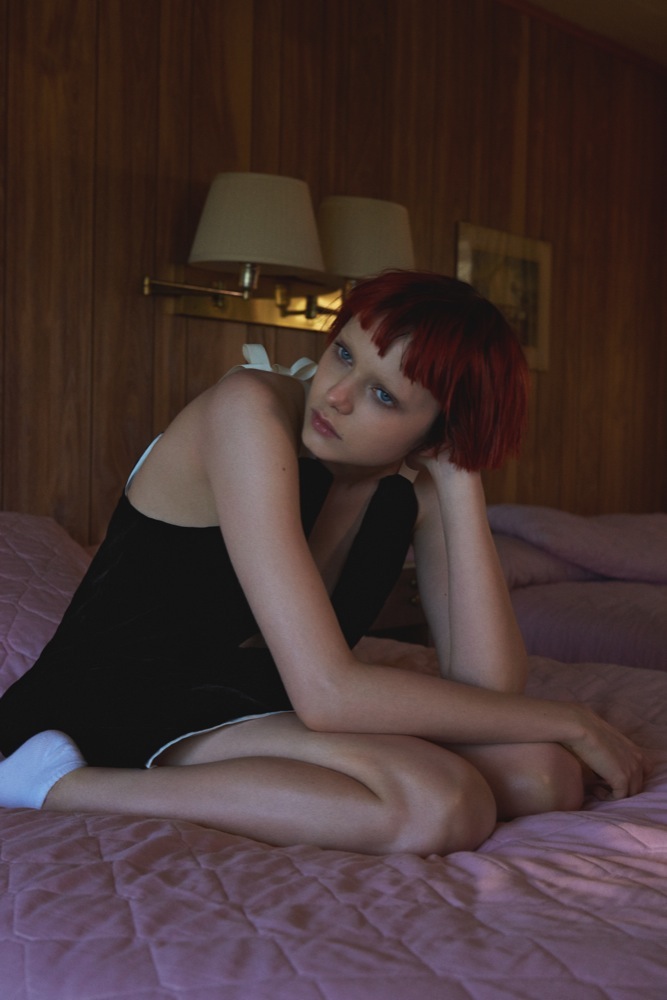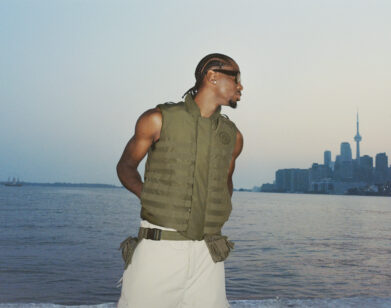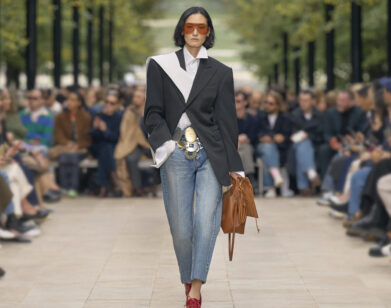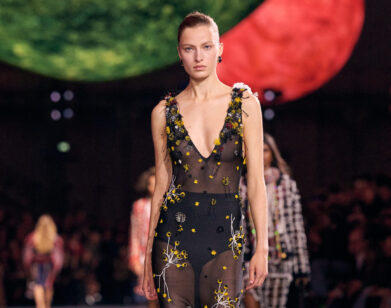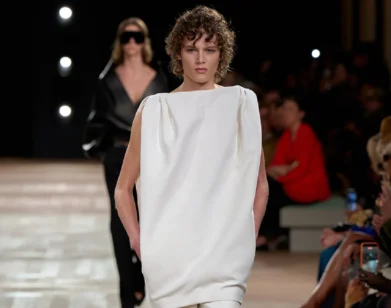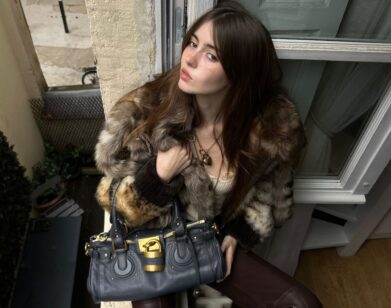Shan Huq and Fashion’s Future
PHOTOS: HANS NEUMANN. STYLING: TALLULAH HARLECH/PRINT AND CONTACT. HAIR: JOEY GEORGE/THE WALL GROUP USING ORIBE. MAKEUP: PEP GAY/STREETERS. MODEL: KATIE MOORE/TRUMP MODELS. CASTING: DAVID CHEN.
“At the end of the day, you have to sell clothes,” says fashion designer Shan Huq over the phone. Such a sentiment might seem oddly practical coming from Huq; raised in L.A., currently based in New York, and still only in his early 20s, Huq often described as an “underground designer” alongside other local labels such as Vaquera. In a city where the runways are ruled by static minimalism, Huq, an autodidact, isn’t afraid to experiment with a playful, party-read, youthful aesthetic. But while he is passionate about his work—he fully invests himself in each collection—he’s not precious about the industry. “I don’t think fashion is art at all,” he explains. “It’s a creative outlet, but it’s not exactly art…it’s to do something creative and innovative, but to make it tangible.”
Here, Huq discusses his attitude to fashion and process with model Katie Moore, whom you may recognize from the pages of Interview, i-D, Vogue, and W, or the runways at Givenchy, Balenciaga, Stella McCartney, Saint Laurent, and Vetements.
KATIE MOORE: Hi Shan. I got to wear some of your pieces in the shoot. I loved them.
SHAN HUQ: Thank you so much.
MOORE: Of course. I have a few questions for you. How did you get interested in fashion?
HUQ: I’ve been interested in it since I was really young—eight years old maybe. My family has always been interested in it and I kind of caught on. I would always go to stores, and the stores would always have videos of the runway shows playing. Then I’d go on the internet and research. That’s how I self-taught. I would research from a really young age.
MOORE: Do you remember the first item of clothing you made?
HUQ: Around nine or 10, I would cut up shirts and write all over them and tie them with ribbons and staples. But tangible clothing, maybe three years ago I got a sewing machine and I tried sewing. The first items of clothing I remember making were t-shirts that I would cut up and turn into something else—they weren’t actually wearable though.
MOORE: When I was nine or 10 I was in my room singing songs. You got out there and did it. When did you move to New York and what made you choose New York?
HUQ: I moved to New York last August, 30 days before my first show. I’m from L.A., so New York is basically the capital of fashion for the U.S. It seemed the most realistic. There was no other choice. There is some kind of weird fashion going on in L.A., but I don’t think it is really relevant to what I’m doing. I went to California State University, Fullerton, in L.A. I studied business for a year and I hated it. I stopped. I would ditch school so much—I thought there was no point in me signing up for classes if I’m never going to show up. The minute I stopped going to class, I started working on my collection. It just happened like that.
MOORE: How do you begin a collection?
HUQ: I think about the overall idea, the concept behind the collection, and then I think of the garments. I need the whole mood. It’s almost like I make a story, and then I think about the people that fit into the story and then I dress them. The clothes are the last thing to be considered. I like a story and a narrative.
MOORE: Okay. With your most recent collection, what kind of people inspired you in your story? Who did you envision wearing the clothes?
HUQ: Last season, I was thinking about when something horrible happens, and that moment right after where you’re like, “What do I do?” Post-something bad. I was also thinking about what was happening in Berlin in the ’80s with the punk scene. At the end of the day I actually can’t do anything that’s angry or hardcore; I always feel like my clothes end up looking very sweet. I’m sure you saw how dresses had little ribbons on the shoulders—I can’t do something that’s 100% angry. So the person who’s wearing it, for this season, is in the mindset of having something horrible happen to them, then they flip the switch and something beautiful comes out of it.
MOORE: I have written down your past collections were inspired by banality. That goes in with that, too—making something beautiful out of it.
HUQ: Yeah. For he first collection—I’ve actually never been to the Midwest or Middle America—I was thinking of an imaginary road trip [and] what it’s like to live in a small town where nothing actually happens. I was just thinking of what people who don’t care about fashion wear: people who just buy a t-shirt to cover themselves, people who just buy jeans to cover themselves. That kind of necessity of clothing rather than getting dressed up. That’s what I was thinking of for the first collection. The story came into Middle America, suburbia.
MOORE: Are there any designers that have a big influence over your thought process and designs?
HUQ: I really, really admire Miuccia Prada. She’s my favorite designer. Everything she’s done and the world she’s created, every collection, it feels 100% emotionally attached to her. She’s not just interested in fashion; she’s interested in art, in cinema, in every creative field. She’s ties it into her collections. It’s really amazing and impactful. The way she makes the set, she creates a story, a full narrative in each collection. That’s really what I admire. She’s one of the only designers that does that 100% that’s working right now. There’s also a wearability to everything she does; it’s not just theatrical. I mean you can’t walk down the street in everything, but 90% you can take the pieces and wear it. She has that, which I really hope I can achieve. It’s interesting and you can wear it. Those are two really important factors.
MOORE: What about younger designers? You’re often described as an “underground designer,” are there any other young designers that you like?
HUQ: I have a lot of friends who are in that young design vein. Vejas, I know. Vacquera. Moses Gauntlett Cheng. All those people are my peers. I really respect what they actually do. Putting out these collections, they’re giving 100% and they just do it. Anyone who does that—gives 100% to what they do.
MOORE: They’re the future of fashion.
HUQ: Yeah, I guess. It’s kind of scary when you think of it like that. You could be something impactful in the end. That’s my main goal; I would like my brand to be as big as possible. It’s nice that Vacquera is an underground designer and they want to express being young in New York. New York has this reemerging of talent. A lot of people were saying, “New York is the most boring fashion city,” and all of a sudden all of these young kids came out and put up their stuff and the press is starting to listen.
MOORE: That’s what New York is all about. Kids coming with a dream and starting from the bottom and—
HUQ: —working your way up. It’s the American dream—coming to a big city and doing what you’ve always dreamt of doing. It’s funny that that kind of story can be relatable. You always think of it as just in the movies, but here we are.
MOORE: Absolutely. What are the next steps for your brand? Do you have any goals you’ve set for yourself?
HUQ: I was actually supposed to show resort. Because most of the collection was not ready, I had to cancel that last minute. We’re just focusing on production. I’m going to be at Dover Street Market. We’re making sure everything is going to be perfect for them. We’re working on the Spring/Summer ’17 show. I think it’s a huge step for the brand in terms of evolving what I want to do. There will be menswear and womenswear; there will be both boys and girls in the collection. It’s the first collection where the collections are not the same—there’s a separate men’s collection shown with the women’s collection rather than both intertwined together. We’re making everything as good as we can. The last collection was a nightmare, working with so many things. Now, it’s just trying to keep a schedule and making sure everything is 100% perfect for production in the next collection.
MOORE: That’s so much work—going from collection to collection. I’ve always thought about that as a model; you’re doing the show for one and then a couple months later you’re already in the next collection. You’re like, “How do they put it out?” Do you ever get—how writers get writer’s block—design block? There’s so much to think about.
HUQ: Sometimes, when I think about things too hard. Usually it takes me two months to get the idea 100%. I think about the concept from the beginning and evolve it and evolve it until it’s perfect. If I did what I thought about in the beginning, my clothes would be ridiculous. If I did the first drawing, god knows what they’d be. It needs to be filtered and filtered and filtered and filtered. Do I get design block? If I try to evolve things at the beginning—”Let’s get this done right now”—that will happen. It would just look like a joke. Sometimes I plan collections really in advance. When I’m working on one, I need to think about the next one. I like each collection to be a TV show. Each season is a season. Each look is an episode of a season.
MOORE: I like that.
HUQ: It’ll all make sense. It’s different, but you’ll see a thread that’s taking you from collection to collection. I need to think about these kinds of things before I finish a collection: “Does it make sense with what I did last time? Is it different from what I did last time? Will the next thing I do make sense with this?” I like everything to go with each other.
MOORE: Final question—this is a broad question—but in your opinion, what is the point of fashion?
HUQ: You need to sell clothes. That’s 100% what it is. But a collection looks inauthentic if you don’t give a 100% of yourself to it. That’s why people, I guess, had a problem with New York Fashion Week. Everything looks so frigid. It doesn’t look like there’s anything to it—it’s look after look of white shirt with black skirt. Everything was homogenous. Nothing stood out. It looked like nobody cared. That’s what I think fashion is: to do something creative and innovative, but to make it tangible.

